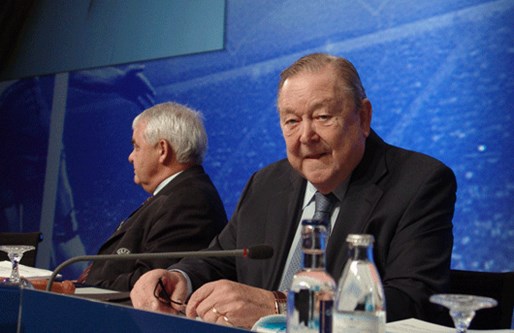Johansson's World Cup

Lennart Johannson at the UEFA Congress in 2007. Photo courtesy of Jens Weinreich, http://www.jensweinreich.de/2010/06/17/lennart-johansson/
24.06.2010
By Jens WeinreichSANDTON. Every morning at ten Lennart Johansson shuffles for breakfast at the Michelangelo Towers Hotel. He walks with a cane, accompanied by his longtime assistant. His age demands respect. Johansson, whose powerful stature always inspired awe, is 80 years old. The Swede has had a full life, he has even served as a football official. He served as the President of the European Football Union (UEFA) between 1990 and 2007, and he is the founding father of the UEFA Champions League.
In silent moments it is clear, however, that it was not his best idea to stand again for UEFA presidency in early 2007. Johansson wanted to block out the 26 years younger Michael Platini from France. Lennart’s candidacy ended in a bitter defeat, it would be his farewell from the main stage. And it took a while until Lennart Johansson was able to cope with his new situation.
At the UEFA election congress in January 2007, FIFA President Joseph Blatter gave him another tough blow. Blatter showed public support for his friend Platini. Johansson could only say: "I do not appreciate that the FIFA president interferes here." This was not the first time Blatter had a hand in defeating him.
The budding rivalry
Nine years earlier, Blatter defeated Johansson the first time. Both men were candidates for the FIFA presidency: Blatter, then FIFA’s General Secretary, and Johansson, then UEFA President. This legendary, dirty election campaign ended on 8 June 1998 in Paris at the FIFA Congress with 111 votes to 80 votes for Blatter in the first round.
Johansson had counted on 100 votes and was really shocked about the result. However, Blatter had not reached the required two-thirds majority, so a second ballot was necessary. But Johansson stopped the proceedings. He stepped to the podium and growled: "The game is over." Then he gave Blatter his hand.
It was a great moment. Johansson was the moral winner. But Blatter was President.
Some say that Johansson was not brutal enough for this job. Others say he was not smart enough. He was not always well advised. However, he has always preferred to be upfront rather than deceitful. Lennart Johansson is one who values humility and the worth of a promise.
For Africa
At the last World Cups in 2002 and 2006 Lennart Johansson was head of FIFA’s Organizing Committees. He has the know-how of what is expected.
"In South Africa," he says, "we can be satisfied with the organization. There are just minor problems.” One must make cuts, from a European perspective, says Johansson. The project needs more careful evaluation.
"We should not be over-critical. I personally see a very different aspect: We Europeans should be grateful that in the past twenty years, African football players have enriched and characterized our football. It is time to give something back. And this is what this World Cup is about.”
It could be said that it is also his World Cup. In the 1990s, Lennart Johansson pushed for UEFA’s Meridian-aid project for Africa.
When FIFA awarded the 2006 World Cup in July 2000, the then FIFA Vice President Johansson was in favor of the German bid – rather than the South African. Johansson had to keep his word to the Germans and his good friend Egidius Braun, then UEFA treasurer. But afterwards he was in favor of the decision for the rotation principle which was the basis to allocate the World Cup 2010 to Africa.
"We have to wipe the white spots open up and explore new regions," he says. In support of this notion he had previously supported the World Cup in the USA (1994) and in Asia (Korea/Japan in 2002). Therefore, between the eleven nations that vie for the upcoming world championships, Johansson sets his favorites: "The 2018 World Cup should go to Russia. And in 2022 it is time for Australia!"
Blatter for Noble Prize?
It displeases Johansson that his old rival Blatter is too much in the center of this African World Cup.
"With all respect for the FIFA president," says the Swede, "but he did not award the World Cup to South Africa alone, even if he makes the impression."
Blatter hopes to get the Nobel Peace Prize in connection with this World Cup. He has publicly said to the author of this article that, of course, he would accept the Nobel Peace Price: “One can not decline such an award!”
At the age of 74 Blatter will not change his character anymore, says Johansson. There are none who know this better than the Swede, who is in the ninth decade of life. He has made his peace, even with Joseph Blatter.
"We are friends," he claims. "It’s all over now. Forget the old stories.” He has often said that in the past . It is not true, but it is a typical Johansson answer.
However, right now Lennart Johansson is only interested in one thing: the health of his wife Lola, who is at home in the hospital. Lennart Johansson left South Africa for his hometown of Stockholm to help her. The World Cup is far away for the old Swede. Will he return to the big stage? He does not know yet.
To read an interview with Johansson from April, click here





